
The Clash were an English rock band that formed in London in 1976 and were key players in the original wave of British punk rock. Billed as "The Only Band That Matters", they used elements of reggae, dub, funk, ska, and rockabilly, and they contributed to the post-punk and new wave movements that followed punk. For most of their recording career, the Clash consisted of lead vocalist and rhythm guitarist Joe Strummer, lead guitarist and vocalist Mick Jones, bassist Paul Simonon, and drummer Nicky "Topper" Headon.

John Graham Mellor, known professionally as Joe Strummer, was a British musician. He was the co-founder, lyricist, rhythm guitarist, and lead vocalist of punk rock band the Clash, formed in 1976. The Clash's second studio album, Give 'Em Enough Rope (1978), reached No. 2 on the UK charts. Soon after, they achieved success in the US, starting with London Calling (1979) and peaking with Combat Rock (1982), which reached No. 7 on the US charts and was certified 2× platinum there. The Clash's explosive political lyrics, musical experimentation, and rebellious attitude greatly influenced rock music in general, especially alternative rock. Their music incorporated reggae, ska, dub, funk, rap, and rockabilly.
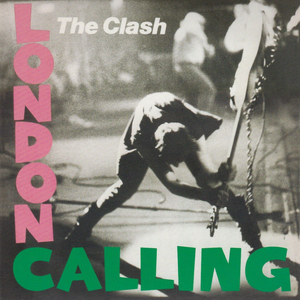
London Calling is the third studio album by the English rock band the Clash. It was originally released as a double album in the United Kingdom on 14 December 1979 by CBS Records, and in the United States in January 1980 by Epic Records.

Give 'Em Enough Rope is the second studio album by the English punk rock band the Clash, released on 10 November 1978 through CBS Records. It was their first album released in the United States, preceding the US version of the self-titled studio album. The album was well received by critics and fans, peaking at number two in the United Kingdom Albums Chart, and number 128 in the Billboard 200. The album is tied with Combat Rock (1982) for being the highest-charting album for the Clash in their native United Kingdom.
"I Fought the Law" is a song written by Sonny Curtis of the Crickets and popularized by a cover by the Bobby Fuller Four, becoming a top-ten hit for the band in 1966. Their version of the song was ranked No. 175 on the Rolling Stone list of The 500 Greatest Songs of All Time in 2004, and the same year was named one of the 500 "Songs that Shaped Rock" by the Rock and Roll Hall of Fame.

Michael Geoffrey Jones is a British musician, singer, songwriter, and record producer best known as the co-founder of the Clash, and as that group's guitarist until 1983. In 1984, he formed Big Audio Dynamite with Don Letts. Jones has played with the band Carbon/Silicon along with Tony James since 2002 and was part of the Gorillaz live band for a world tour in 2010–2011. In late 2011, Jones collaborated with Pete Wylie and members of the Farm to form the Justice Tonight Band.
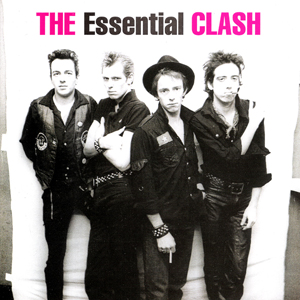
The Essential Clash is a career-spanning greatest hits album by The Clash first released in 2003. It is part of the ongoing 'The Essential' Sony BMG compilation series. The album is dedicated to Joe Strummer, who died during its compilation.

"White Riot" is a song by English punk rock band the Clash, released as the band's first single in March 1977 and also included on their self-titled debut album.
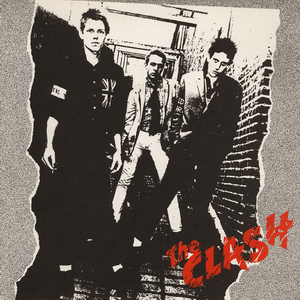
"Remote Control" is a song by The Clash, featured on their debut album, and is written against oppression and conformity.

"(White Man) In Hammersmith Palais" is a song by the English punk rock band the Clash. It was originally released as a 7-inch single, with the b-side "The Prisoner", on 16 June 1978 through CBS Records.
"Police and Thieves" is a reggae song first recorded by the falsetto singer Junior Murvin in 1976. It was covered by the punk band The Clash and included on their self-titled debut album released in 1977.
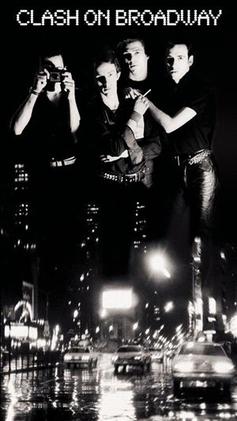
Clash on Broadway is a box set compilation album by the English punk rock band the Clash, released on Legacy Records in 1991. It comprises 64 tracks on three compact discs, spanning the time period from their 1977 debut single, "White Riot", through the Combat Rock album of 1982. It does not include material from the band's final sessions led by Joe Strummer and Paul Simonon, resulting in the final album Cut the Crap (1985). It was initially released in longbox form.
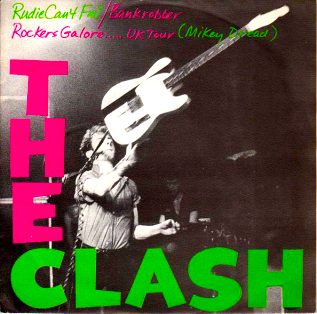
"Rudie Can't Fail" is a song by the English punk rock band the Clash, featured on their 1979 album London Calling. The song was written by Joe Strummer and Mick Jones, who sing it as a duet.
Capital Radio is a song and an extended play by the English punk rock band the Clash. The original song has been included as "Capital Radio" or "Capital Radio One" on the Capital Radio EP (1977), Black Market Clash (1980), The Story of the Clash, Volume 1 (1988), Clash on Broadway (1991), From Here to Eternity: Live (1999), The Essential Clash (2003), and Singles Box (2006).
"Janie Jones" is a song by the English punk rock band the Clash. It is the opening track on their debut album, The Clash (1977). The song is named after Janie Jones, a cabaret singer who organised sex parties at her Kensington home.
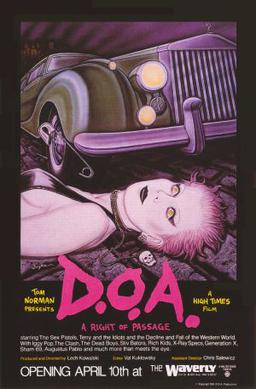
D.O.A.: A Right of Passage is a 1980 rockumentary film directed by Lech Kowalski about the origin of punk rock. The rockumentary takes interview and concert footage of some of punk rock's earliest bands of the late 1970s scene. It features live performances by the Sex Pistols, The Dead Boys, Generation X, The Rich Kids, X-Ray Spex, and Sham 69, with additional music from The Clash, Iggy Pop, and Augustus Pablo.
Ray Gange is a former actor from London, England, best known for his portrayal of the roadie who starred in the film Rude Boy. The film won various awards, but Gange did not continue his film career.
The Clash were an English rock band that formed in 1976 as part of the original wave of British punk rock. Along with punk rock, they experimented with reggae, ska, dub, funk, rap and rockabilly. For most of their recording career, The Clash consisted of Joe Strummer, Mick Jones, and Paul Simonon, with Terry Chimes or Nicky "Topper" Headon on drums and percussion. The band features in several documentaries and other films.
"Garageland" is a song by English punk rock band The Clash featured as the final track for their 1977 debut album The Clash.

Sound System is a box set collection by the Clash released in September 2013. The box contains the band's studio albums newly re-mastered by Mick Jones, with a further three discs featuring demos, non-album singles, rarities and B-sides, a DVD with previously unseen footage by both Don Letts and Julien Temple, original promo videos and live footage, plus an owner's manual booklet, reprints of the band's original 'Armagideon Times' fanzine and merchandise including dog tags, badges, stickers and a poster. The boom box packaging was designed by Paul Simonon. The set was released simultaneously with 5 Album Studio Set, which contains only the five studio albums, and a greatest hits package titled The Clash Hits Back.













